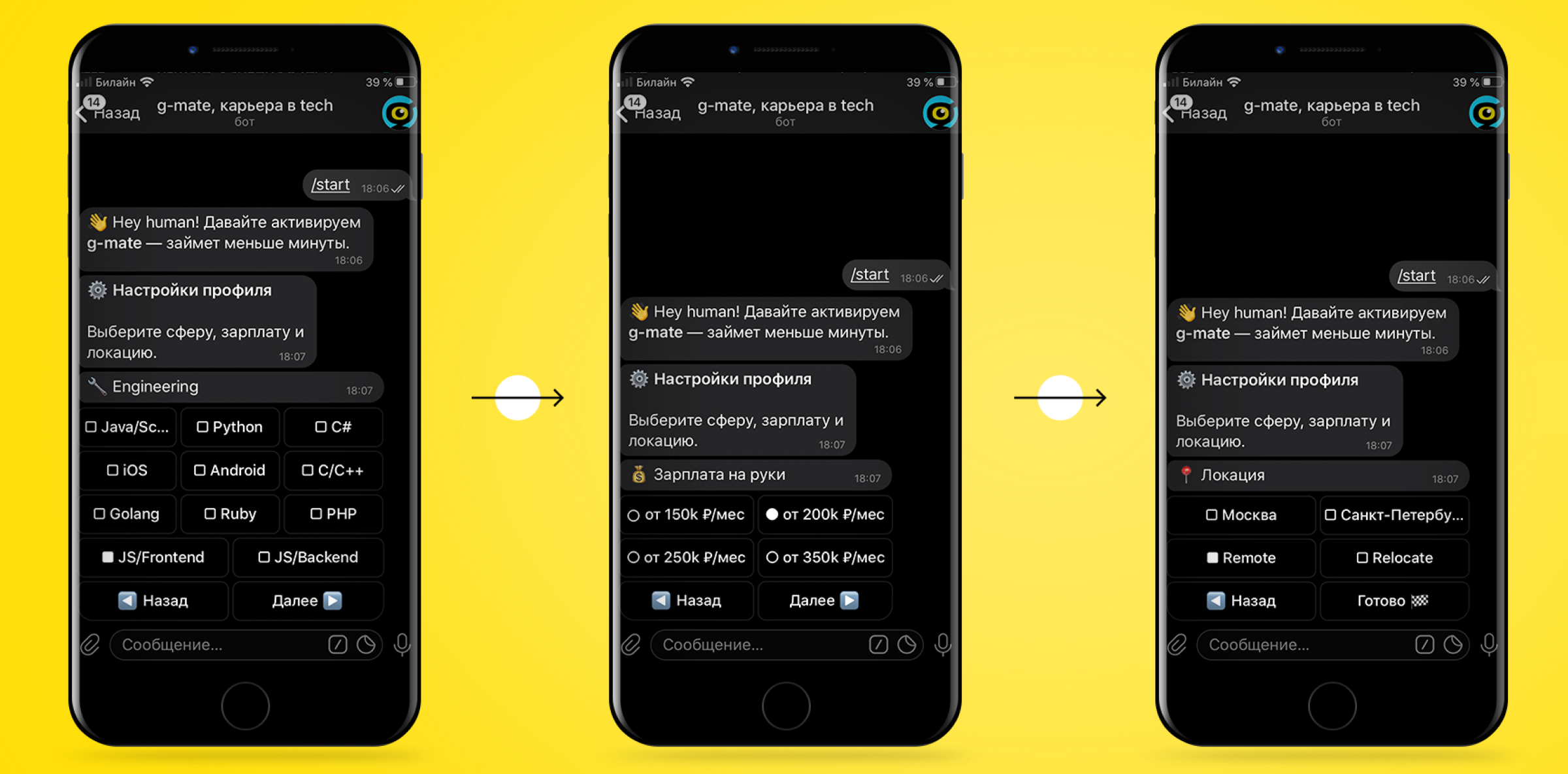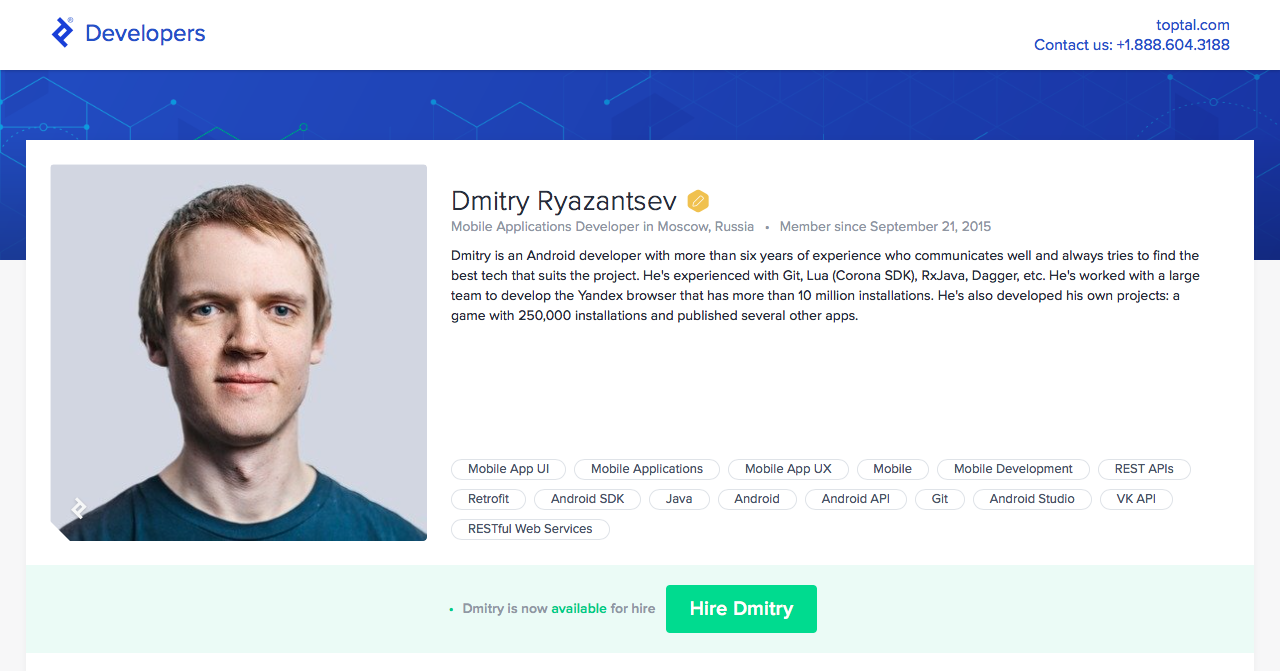
Why did you choose a remote?
Initially, I started doing mobile development while still at the institute. I made my own games, small applications, and after graduation I went to a web studio. From there I was hunted by Infotex - they deal with cybersecurity for mobile devices, and then I moved to Yandex. I worked there for 3 years, and then I realized that it was interesting to try the remout. In addition, in 2014–2016, the ruble exchange rate became not very good, so I gradually switched to remote work and I don't really want to return to the office.
In general, if there is a desire to gain access not only to Russian companies, there are two options: relocation or remote.
I didn't really want to move. With relocation, in general, you need to understand well why you are doing this. If your whole life, family, relatives, friends are in Russia, and besides, you look at the exchange rate - then the meaning of moving is lost. It is much more profitable to receive a salary from us, not even the same level as abroad, but a little lower. In America, they pay somewhere around $ 80-120 per hour, but you need to deduct taxes - then what will you have on hand? And we have 13% of personal income tax or 6% and lower for individual entrepreneurs, as a result the amount comes out much more.
According to the experience of my friends, in case of relocation, you are bound by a contract for at least 3 years, according to it, you cannot change the employer, or you pay the company a relocation package. Therefore, this option was not suitable for me.
Yes, there may be difficulties when switching to a remote location. The first is the design. Accounting, contracts - you will have to deal with all the paperwork. The second is the combination of life and work. When working in an office, there are time frames - they can be shifted, but they are still there. Conventionally, you start at 11, finish at 19, and at home, most likely, you already do nothing. There is no such thing on the remote. I woke up - and it began: either life, or working hours. The difficulties of time management are something that you face at least at the start.
The remout has its advantages. Flexibility appears: access to travel and a more measured work format opens up. If you need to go to the dentist, I went in the middle of the day, postponed the end of working hours to a later time. I need to call - phoned from the queue. You don't waste time and energy on the way to the office - this hour can be more interesting. In addition, you start earning a lot more.
So in 2016, on the May holidays, I got a job through Toptal for my first project.
If you are looking for remote positions, subscribe to our bot @g_jobbot . It is easy and quick to set up: sphere, salary, "remode" location. The options that suit you will be sent to Telegram.

How does Toptal work?
Toptal is more likely not outsourcing, but outstaffing: they take a person and introduce them to the team on the other side, most of all like a full-time remot. You are given a project, and you do it.
On exchanges like Upwork , Freelancer , Fl.ru , Weblancer, the customer needs to solve a problem for a specific project, for example, fix bugs in the application. He goes and orders the development, looks at the responses of specialists and selects someone by experience and profile, and the exchange receives a fixed percentage.
Venues like Toptal, Crossoverwork a little differently. The specialist gets to the platform, there are projects. But you need to contact not with a specific customer, but with a “matcher” - the person who is leading the project, and he negotiates with the customer about the working conditions. If the client is inadequate, wants to do unrealistic things, or pays little, the matcher may refuse him. Plus, everything that needs to be done independently on exchanges like Upwork - accounting, execution of contracts - Toptal takes over.
How much a client pays for you to Toptal is unknown, and this does not even bother you as a specialist. Because when you come to the platform, managers ask about the rate. You name the rate per hour, they agree, or they may say that it is slightly inconsistent with the salary in the region. If everything is okay, they will pay this amount, the platform gets some other one and makes money on the difference. Everyone is happy.
Toptal has three options: hourly wages, part time 20 hours per week, or full time 40 hours. Theoretically, you can ask to increase the load to 60 hours if you can handle it, but I haven't tried it.
The terms of projects are different: there are both for a week and for several years. I had projects for six months, for 9 months, and for several weeks - to make an application. Even if the deadline is 4-8 weeks, customers may enjoy working with a specialist so much that they often do not want to let him go. So people stay for 1–3 years, and if they don’t want to, they return for the hour or change the customer. A specialist can be bought from the platform, but this rarely happens, because it is very expensive.
When one project ends, you need to start actively monitoring the site and ping managers. It is important to understand that no one owes anything to anyone. You can receive invitations to projects, but you should also take the initiative yourself. Therefore, you should not just press the button - "I want to come here!" and wait ... The next day you ask the matchers: well, how? It's like in life: the more you get it, the more they want to give you what you need, just to get behind. With active positioning, there will be no problems with customers. I had a maximum break of a week and a half or two.
It is very important which stack. I know a Unity developer - it was hard for him. And if mobile development, web, full-stack - no problem. There will be work for devops, but for testing in a project, according to experience, they will rather hire an outsourcing company, it will be difficult for testers at Toptal to find something for themselves.
The tasks are quite different. Someone needs to quickly download the application, others need it more globally - once we made a near-bank application, technically it was quite difficult, and the whole team was distributed: both management and design. When you match, you see what tasks are needed. Most often, as elsewhere - to typeset forms, to make simple mobile applications, if the web, full-stack - to make a website.
How is the interview going?
There are several stages at Toptal, in Crossover, I think everything goes about the same.
- First - a conversation in English, 5-10 minutes, just to make sure that you can understand the person and the person can understand you.
- The second stage is Codility , where you code the algorithm, points are awarded according to the Olympiad principle. Three tasks - 300 points, you need to get a passing threshold.
- Then - algorithmic tasks, simpler: at this stage, they simply check that the same person submitted the solutions to Codility.
- The final is a test project for several days and its defense.
Problems are difficult, but not of the Olympiad level.
Is it possible to level up while working for Toptal?
Only alone. Experience in an office gives a lot for development: when 10 people sit next to you, who can be much cooler than you, experience goes faster. An important point: when hiring a specialist at Toptal, the company assumes that the person is pumped. Most likely, he will be one of the strongest on the project - they are considering seniors, not even middle ones. At least that's how the platform positions itself - there are no mid-level developers here.
Therefore, it will be difficult for Jun to find a project and grow: the experience that you get in a team is difficult to get while sitting at home alone. If you are only at the beginning or in the middle of the journey, it is better to improve your skills in the office. First, work in a team, then a remote - no questions asked, remote - an option for free movement in the future.

How does the working day work? Do I need to report on working hours?
Exchanges like Upwork can screen the desktop every ten minutes and send it to the server. Toptal doesn't track it like that unless the customer requests it. You work full-time - you just work, unless the customer asked otherwise, you work hourly - you fix the hours. Nevertheless, it is always useful to log the work done at least for yourself.
As far as I know, Crossover has tools that log time, while Toptal does not. They have an OpenSource time tracker, but no one obliges to use it. If a specialist does everything that is asked of him and even a little more, then as long as he meets the requirements, no one will have any questions.
Activity during the day depends on the project. If it is relatively small and you are almost the only developer in the team, then every day there will be a stand-up for ten to twenty minutes, and this is all communication in a day. The rest is coding. If the team is bigger, there may be constant calls and messages in Slack.
It also happens that you only code for 8 hours, but in my case this rarely happens: I am more of a team lead, so I often have to call someone. And so - they threw in tasks, I get down to work, I often even set a timer so as not to stay too long, code-code, then take a break and code again.
What's with the money?
It is difficult to compare salaries at the exchange and in the office, because hourly wages are unevenly distributed throughout the year. This in Yandex multiplied the amount per month by 12, received the annual. And then you multiply it by the number of hours - and the amount of work per month can vary. So it won't be possible to answer unequivocally.
I wrote out the numbers in detail in my blog .
- Jobboards offer Android developers a salary of about RUR 80,000-335,000,
- on Upwork for the same specialists the spread is 100 thousand - 1 million, on average - 230,000 rubles,
- according to a report by Payoneer, the average freelance rate for 2018 is $ 21, the range is about $ 15-30, and then how long will you work.
- On the Toptal page, you can see how much the platform asks the company for a developer - from 600 thousand to 1 million rubles per month. As a result, the senior specialist receives approximately 300,000-500,000 rubles. On average, it comes out 1.5-2 times more than in the office - the figure is so high, because since 2014 companies that pay salary in dollars have begun to come to Russia, and this slightly raised the price tag.
Payoneer service in Russia has ceased. But there are no problems with withdrawing money, the easiest way is to register an individual entrepreneur, and the salary will fall on the account. You go through currency control by sending an invoice - what you did and how much you owe - and everything goes through the banks in a white way.
Working on a project, once a year on Toptal, you can ask to raise your hourly rate. You can also change it in between projects.
Sounds too good. Where is the catch?
The main catch is that remote work requires a certain level of independence and self-organization. In addition, you need to deal with the fear that you will be left without a project, and the line between work and life is also blurred - therefore, people are afraid to switch to a remote.
There is also a complication in how the vacation is organized. Toptal has no vacations at all - you can ask for a break, a pause in work. It is clear that you can ask not on the second day of employment in the project and not before the release - here and in the office team they will not let anyone go, this is generally about the adequacy of you as a person.
You ask the manager, he coordinates the break with the client - or you yourself initially agreed on everything with the client - and you just don't work. In permanent remote work directly with the company, there may be paid vacation. Immediately you realize how many hours you will not work and how much money you will lose for your absence - this fact is very pressing, I know from myself and from friends.

How to find a long-term remot project and get a job in a team on a permanent basis?
It can be difficult to get a job in American companies - there are thousands of removed jobs on Stack Overflow, but they contain a postscript: you must be in America. Therefore, it is better to count on European projects.
Although, from the point of view of requirements, a relocation is simpler than relocation: for relocation, companies must be very much interested in you as a specialist in order to transport. But even for remote work, you need to prove your usefulness: if they can find a local person in the office, they will hire him.
Project search platforms - Stack Overflow , AngelList .
If you have worked through exchanges for some time, and there is 1-3 years of successful work experience on a remodel, then the chance of finding a job on the same Stack Overflow greatly increases. Therefore, it makes sense to first gain remote experience on Toptal, and then go directly to customers. This is exactly what I did: in between projects I found a company, passed an interview and for the second year I have been working with them directly.
Advanced English is not required, but, of course, you need to know it, and be able not only to read technical literature and correspond, but also communicate orally: understand what questions are asked and be able to answer them. Still, at the stand-up you will need to tell what you did in the day, or a product manager may come and ask about the bug and what to do with it.
The portfolio will work for you during the interview. If there is a stack of projects, they will mostly be looked at. Interviews like in Yandex: come five times to different sections of the interview, often you don't need to conduct a full-fledged conversation. Most likely, no one will evaluate in several stages what a specialist can do. They will see what the person has been doing before, how relevant the experience is to what is written in the resume, and conduct a short interview for 10–20 minutes. From this point of view, it’s probably more difficult to get a job in an office at some point: in a remot you have already shown everything that you can do with your past projects.
To summarize, I would suggest this tactic.
- Fill out profiles on GitHub , Stack Overflow, AngelList, and of course Linkedin .
- Crossover Toptal — , . , - , . , - .
- , , , — . Linkedin — , .
- , .
3 ,
- . , - , . Rescue Time, . : , ! , .
- — . , , . , , , .
- . — , . , , , .
:
g-mate (@g_jobbot), , , Telegram.